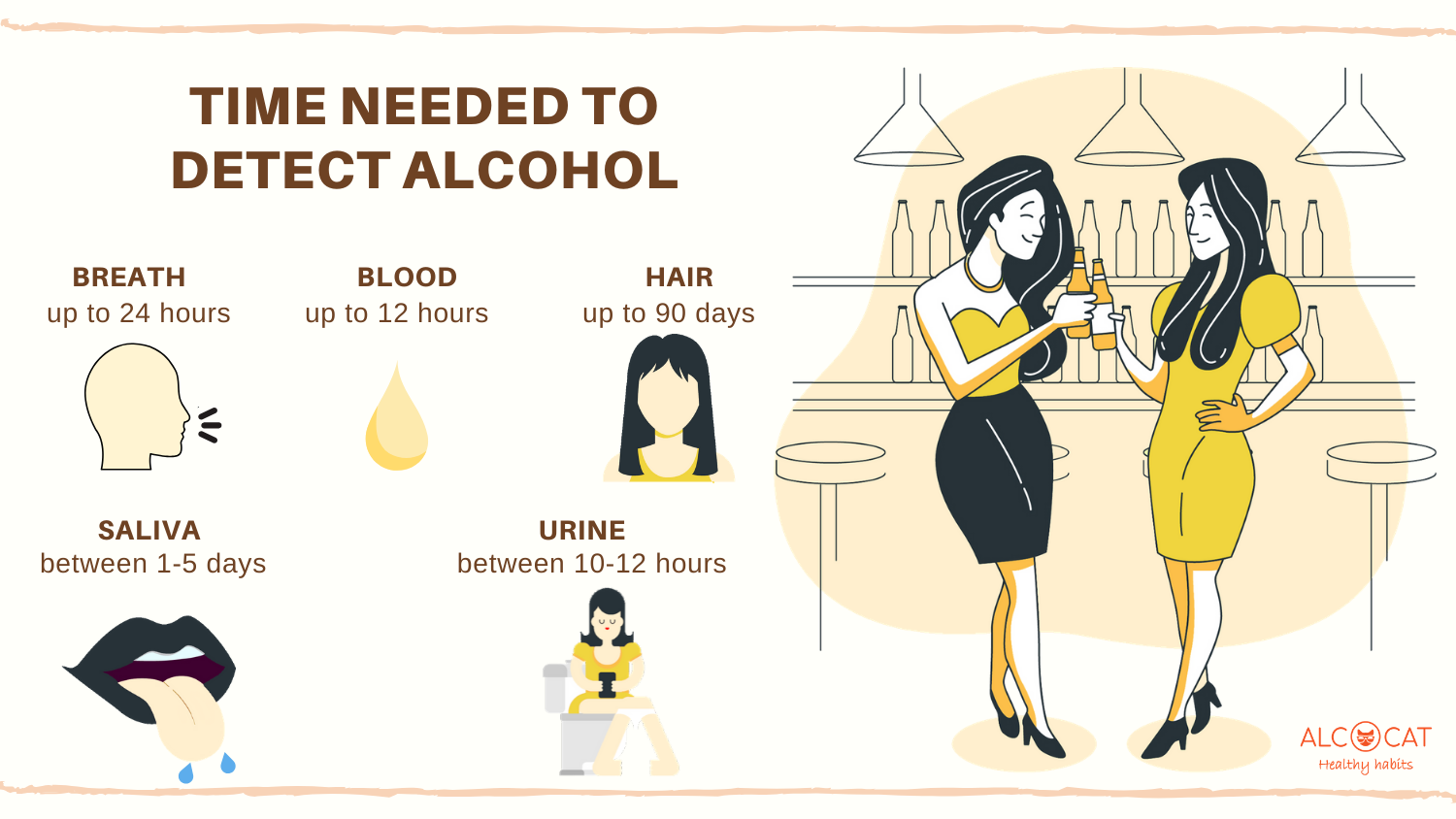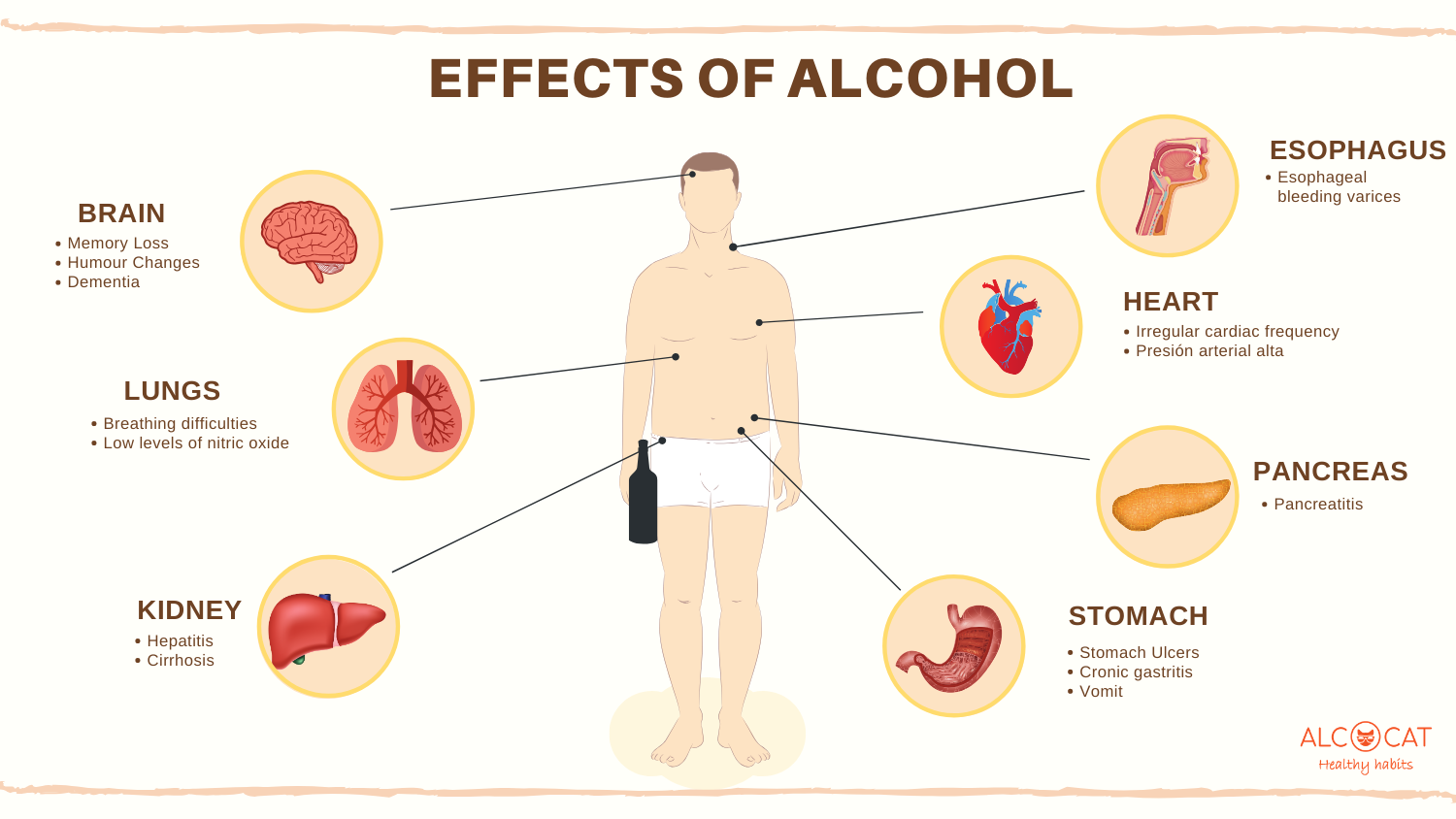Celebrating special events with alcohol is great, but it is even better if you do it responsibly. The most commonly asked questions about when you have a few drinks are: How long does alcohol stay in your bloodstream? Would I be positive for a DUI? Is there any way of getting rid of the presence of alcohol in my body? Alcocat will provide you with all these answers.
Drinking and driving is one of the main risks for transit security and it produces a huge amount of accidents. Also, this can affect other people. Because of this, it is important to know how long alcohol stays in your body.
What happens in your body when you drink alcohol?
As soon as you drink the first cup of alcohol, your body starts a very simple process to metabolize this substance.
The alcohol goes through your esophagus and travels to your stomach until it reaches the small intestine. Almost 20% of the alcohol is absorbed by the stomach, and the other 80% is absorbed by the small intestine. From here, it goes directly to the bloodstream and when this happens, it starts affecting our body systems and our corporeal functions.
When the heart pumps blood, it very rapidly reaches the brain and the spinal cord. This causes our organism to slow down and that is why you experience dizziness and why clear thinking gets harder. Therefore, making important choices while you’re drunk is a very bad decision.
The largest amount of the alcohol we ingest ends up in the liver; there it goes through the metabolization process.
Tricks to rid your body of alcohol

Most likely, you have heard many myths about effective ways of getting rid of the alcohol in your bloodstream. Some of them are- drinking coffee, showering, chewing gum, exercising or just plain sleep. However, there is no proven way of accelerating this process. This means that if you want to pass a DUI test, you shouldn't rely on these tips.
There is no way of deceiving an alcohol meter. When a person goes through an alcohol testing, the device registers the air contained in the pulmonary alveoli and not from the mouth or the stomach. As a result, the real levels of alcohol in our blood get revealed.
How long does it take for our body to eliminate the alcohol?
In brief, if there’s no way of cheating on alcohol testing: How long does it take for our body to eliminate alcohol from our system?
Usually, the body gets rid of alcohol in 3 ways: through evaporation, through excretion or through the metabolism. The liver is the one in charge of metabolizing the alcohol present in our bloodstream. However, it can only metabolize 0.12g/l every hour, meaning that the liver takes one hour to process each drink. It takes time for our bodies to process all the alcohol we have ingested during an intense night. This process can last up to 12 hours.
The body is very effective in eliminating alcohol. It is estimated that about 90-98% of ingested alcohol is metabolized and absorbed. The rest gets expelled through sweat, urine, vomit or feces.
Alcohol in your body can be detected by a blood or urine test, or even by a sample of your -
- Alcohol can stay in the urine up to 80 hours
- Alcohol can stay in the bloodstream up to 24 hours
- Alcohol can stay in hair follicles up to 90 days.

Factors that affect the presence of alcohol in the organism
A lot of different factors influence the permanence of alcohol in our organism. Usually, this varies depending on the quantity of alcohol that you have taken, your weight, age, gender and whether you have eaten before ingesting the substance.
Gender
For physiological reasons, alcohol gets metabolized in a different way in women and men. Men tend to be more alcohol tolerant because they retain more water in their bodies. Also, they have enzymes that provoke alcohol to decompose much faster.
In women, alcohol usually stays in the body for a longer time. This happens because the female gender stores more fat and retains less water in comparison to men. Furthermore, women may have a higher blood alcohol percentage when they have their period.
Age
The older a person, the longer alcohol will stay in the liver before going to the bloodstream. This causes an increase in the duration of the effects of ingested alcohol. Similarly, when a person ages, water retained by the body decreases. All of this causes the percentage of alcohol present in the blood to rise.
Food
Having food in the stomach can also affect alcohol blood percentage. Being well-nourished can help dilute alcohol and delay the amount of time that alcohol stays in the stomach before arriving to the small intestine, where alcohol gets absorbed much faster.
A person with an empty stomach can reach an alcohol blood percentage up to three times higher. For this reason, eating while you drink is recommended, in order to slow down the velocity at which alcohol is absorbed by our body.
Effects of alcohol in the body
The effects of alcohol in the body start to be noticeable from the first time you take a sip. When you start ingesting alcohol in small doses you start feeling much more relaxed and open- This is why having a drink can be a good idea! However, if the consumed amount is too big, you could get intoxicated and start showing the following effects:
- Euphoria
- Loss of inhibitions
- Retarded speech
- Slow reaction time
- Humor changes
- Loss of coordination
- Bad judgment
- Vomiting
- Impairment in walking
Effect of alcohol abuse
Excessive alcohol consumption can provoke serious health problems. Below we will show you the main ways in which this can affect you:
Liver
One of the main effects of alcohol abuse is liver damage. With time this organ can get inflamed because of excessive booze. As a result, you could develop diseases like fatty liver, alcoholic hepatitis, fibrosis, and cirrhosis. You could even get liver cancer.
Digestive System
Consuming vast amounts of alcohol can wear off the stomach coating and can increase the production of digestive acid. This can provoke ulcers. At the same time, this can affect the absorption of nutrients and lead to very serious neurological problems. Also, this could affect sugar levels in our system.
Bones
Drinking alcohol can cause an imbalance of calcium in the body. Remember that keeping strong and healthy bones is very important. Likewise, this excessive consumption can result in an interruption of Vitamin D production, which is necessary for the absorption of calcium- A lack of calcium can cause osteoporosis, an illness that can cause bone fractures.
Pancreas
If you drink alcohol for many years, you could affect your pancreas. During the first phases, the effects of this substance go unnoticed. However, with time it can make our blood vessels to increase in size provoking pancreatitis. This illness increases the chances of developing pancreas cancer.

After knowing all this information about the effects of this substance: do you still think it’s worth it to abuse alcohol?
Drinking responsibly
Understanding how much time your body needs to absorb alcohol is very important in order to prevent an excessive consumption of this substance. Also, you should remember that ingesting alcohol while taking medication can be very dangerous. According to the OMS, alcohol can be the cause of more than 200 illnesses.
The problems caused by alcohol consumption can be very serious. The abuse of this liquid is considered by the NIH as a disorder: compulsive consumption of alcohol that causes a loss of control and a negative emotional test when deprived of the substance.
We are not saying that going out for a drink or two is bad. All we need to do is have self-control so that we don’t get drunk. Also, we should know that drinking and driving is a very bad mixture. We put our own lives and those of others in danger. To know if you can drive after drinking you can use the Alcocat® alcoholmeter. This device will increase your consciousness about your physical state.

